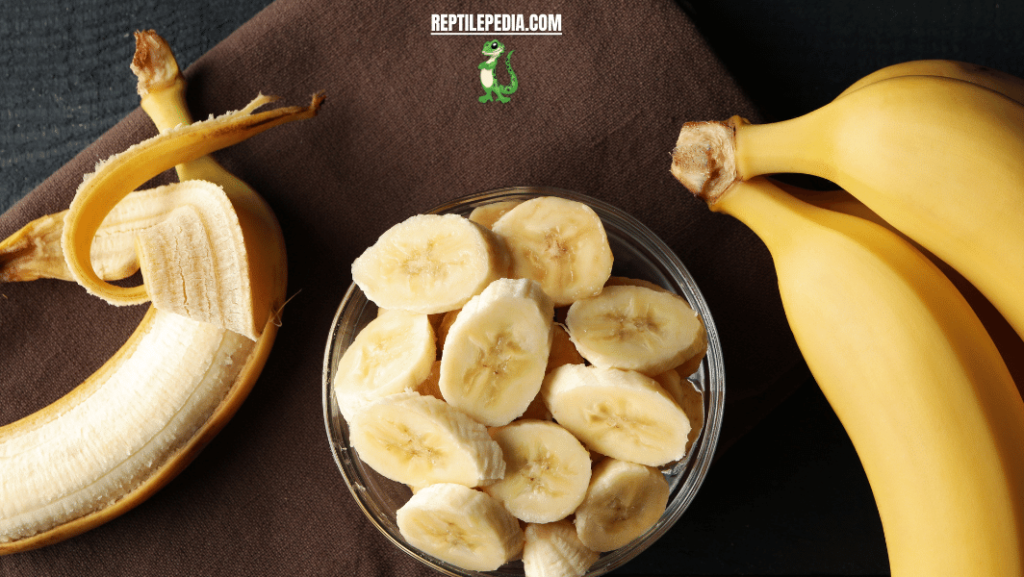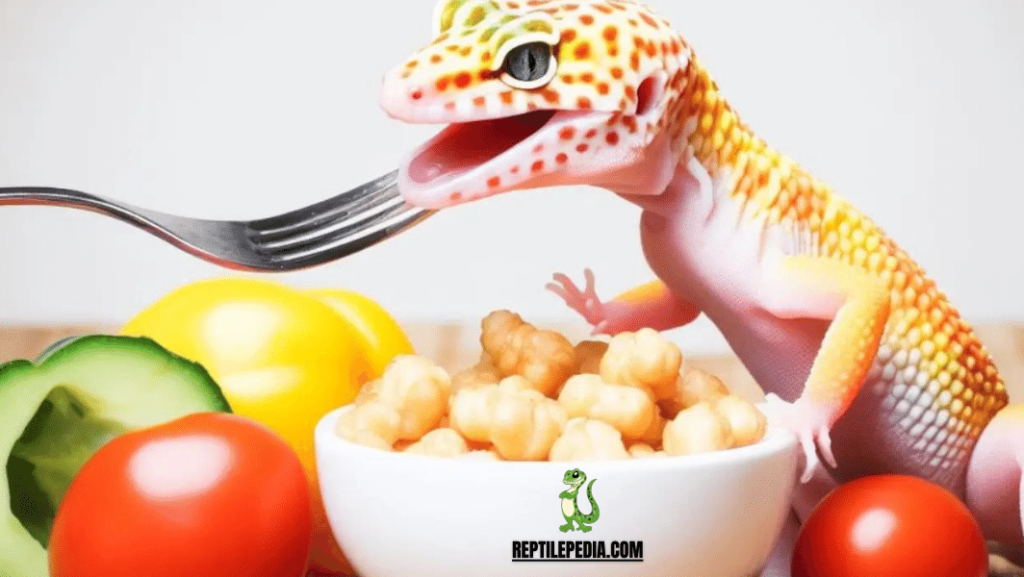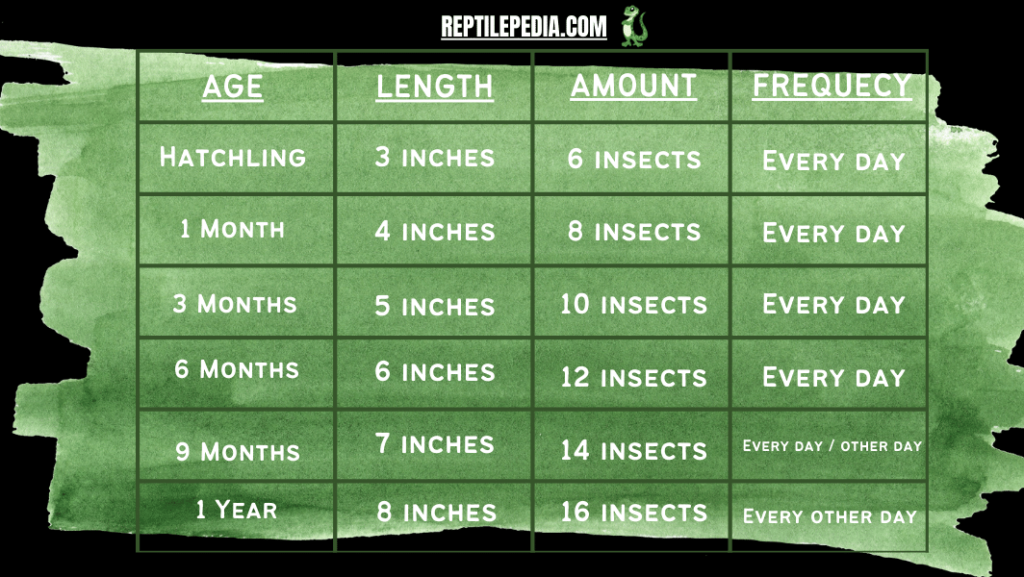As an owner of a leopard gecko, you might have wondered whether it’s okay to offer some fruit to your scaly companion. Perhaps you’ve even considered placing a piece of apple in their habitat…
But here’s where you should Stop! There’s one very small exception, but generally, Leopard geckos cannot eat fruits.
Pet lizards, like leopard geckos, are insectivores, meaning their correct anatomy is designed to properly digest insects, not fruits. Offering fruits as a snack might seem harmless, but it can give your pet gecko issues like mouth sores and indigestion. These complications should ideally be avoided unless prescribed by a veterinarian. In this article, we’ll explain in detail why leopard geckos shouldn’t eat fruit and what alternatives you can offer your scaly friend as a treat in place of fruit.
Table of Contents
Can Leopard Geckos Eat Fruit?
Technically, leopard geckos can eat fruit, sort of like how people can eat styrofoam. Sure, they can chew it up and swallow it, but it’s not doing anything good for them. In reality, leopard geckos can’t properly digest fruit because they are not designed for it. In the wild, these lizards are found in climates where fruit is a scarce resource. Unlike tropical geckos, leopard geckos never encounter fruit in their native countries, like Pakistan and Iran.
The environments where leopard geckos thrive are typically hot, dry, and rocky. The food choices available to leopard geckos in the wild are primarily tough desert insects. They have naturally evolved to eat these creatures and are true insectivores. This trait and their characteristics make it really difficult for them to digest fruit.
Discussing further below, we’ll talk about why fruits are a poor choice for these reptiles. Their digestive system, honed by their natural habitat and diet, isn’t equipped to handle the sugars and fibres in fruits. As true insectivores, their bodies are optimized for digesting insects, not the complex sugars and fibres found in fruits.
Why?
When it comes to the diet of leopard geckos, one must consider their specialized digestive system. Unlike omnivorous or herbivorous animals, these geckos have a digestive system that is not equipped for plant-based foods. Fruits are high in cellulose, a type of fibre usually found in vegetables and fruits, requiring a longer and more acidic digestive tract to effectively break down.
This kind of digestive system works great for humans and other plant-eating animals, but for leopard geckos, originating from the arid environments of the Middle Eastern deserts, it’s a mismatch. Their evolutionary path has led them to develop a shorter, alkaline digestive system that is specifically suited for digesting insects and meat, not the complex fibrous structures of fruits.
The core of the issue lies in the fact that their little tummies simply aren’t designed for the specific fruit types we commonly consume. While the occasional piece might not harm them immediately, most fruits can potentially be harmful. This list of unsuitable fruits includes Strawberries, Apples, Watermelon, Oranges, Blueberries, Lemons, and Peaches. Even if you may have noticed your pet eating a piece of fruit you’ve tossed in, it’s essential to understand that this doesn’t equate to it being healthy for them.
Leopard geckos’ lack of a suitable digestive mechanism for fruits begs critical questions about the suitability of such a diet, leading to the conclusion that fruit, while not immediately dangerous, is not an advisable regular addition to their diet.
Will Leopard Geckos Eat Fruit?
In general, Leopard Geckos are seen as opportunistic eaters in their natural habitat. This trait leads to a common question: Will Leopard Geckos eat fruit if it’s offered? The short answer is yes, they will. However, just because they can doesn’t mean they should. When a Leopard Gecko eats something outside of its typical diet, it’s often a sign that the creature is hungry and needs to be fed a more proper, leopard-gecko-friendly meal.
As a reptile enthusiast, I’ve seen this firsthand. Occasionally, a Gecko left with no other options might grab the fruit. However, this should be viewed more as a survival tactic rather than a dietary preference. So, what should you do? Grab yourself some Dubia roaches, coat them with their favourite calcium and vitamin D3 supplement, and let your gecko feast for 15–20 minutes. This approach ensures that your pet is not just eating but thriving with nutritionally rich food that’s tailored to their needs. Remember, just because they will eat something doesn’t mean they should.
What Fruits Can Leopard Geckos Eat?

As previously noted, there exists a singular exception to the typical guideline against offering fruit to a leopard gecko. What is this exception? Bananas. A word of caution, though: even though bananas are not as hard on digestion as other fruits, they aren’t something you should regularly feed your pet. Usually, veterinarians recommend feeding fruit to sick geckos as a measure to maintain their glucose and hydration levels.
In such cases, bananas are made into some sort of insect-banana “smoothie”, providing a nourishing blend while the sick gecko recovers.
From personal experience, this is a rare but effective method. Remember, while bananas can be a temporary aid, they shouldn’t become a staple in your gecko’s diet. The focus should always be on providing a balanced and species-appropriate diet to ensure the health and longevity of your beloved pet.
Why Leopard Geckos Struggle with Fruits?
Other reptiles, like chameleons, bearded dragons, and iguanas, have no problems eating fruits. These fruits form a healthy dose and are a part of their regular diet. So, why can’t leopard geckos digest fruit effectively? Here are a few important reasons why. Unlike these other reptiles, leopard geckos have a different digestive system that is not equipped to break down the fibrous and sugary nature of fruits. This can lead to digestive issues and nutrient imbalances. Therefore, while it’s fascinating to see the dietary diversity in reptiles, it’s crucial to understand and respect the unique needs of each species, including the leopard gecko.
1: The Absence of Cecum in Leopard Geckos
The key to understanding why Leopard Geckos can’t digest fruit lies in a small but crucial part of the digestive system called the cecum. This digestive organ plays a significant role in breaking down plant matter. Most mammals that eat vegetables possess a cecum, as it houses helpful bacteria that aid in the breakdown of plant matter. In contrast, some reptiles, including Leopard Geckos, do not have a cecum. Why is this important? The absence of a cecum means these geckos lack the necessary bacteria to process plant-based foods effectively.
In the animal kingdom, most herbivores contain a larger colon to accommodate their plant-heavy diet. However, for carnivores and insectivores like Leopard Geckos, the cecum is either small or completely absent, often replaced by an appendix. Their bodies don’t produce copious amounts of bacteria needed to digest cellulose found in plants. This limitation is one of the reasons why offering your pet gecko fruit isn’t a good idea. They simply don’t have the ability to digest these food types easily, making fruit an inappropriate choice for their dietary needs.
2: Digestive Challenges in Leopard Geckos
Another reason geckos shouldn’t have fruit, particularly, is due to their short digestive tract. These reptiles are designed for great efficiency in digesting simple animal proteins. It’s been noticed that plant matter is harder for them to process as it takes longer to break down in their intestines. This extended digestion time is not ideal, as it means the food spends more time passing through the body. For comparison, consider cows, which are strict herbivores with long digestive tracts and four separate stomachs to efficiently digest grass.
In contrast, a Leopard Gecko doesn’t have the capacity to fully digest plant-based foods. Feeding them fruit can most likely result in bad stomach cramps and difficulty defecating. This contrast highlights why understanding the dietary needs specific to each animal is crucial. Offering fruit to a pet leopard gecko, despite their inability to properly digest it, is not a good idea and can lead to unnecessary health issues for these otherwise hardy and fascinating reptiles.
3: The Alkaline Nature of Leopard Geckos’ Digestive System
A crucial factor in understanding why Leopard Geckos can’t digest fruit lies in the difference between alkaline and acidic environments in their gastrointestinal tract. The pH scale is key here: a score below 7 is acidic, while anything above is alkaline. An acidic digestive system is optimal for digesting tough plant matter. However, Leopard Geckos have an animal alkaline system, which does not produce more acid to help digest plants. In fact, too much acidity can be dangerous to their overall health, potentially causing inflammation and putting these animals at risk for other health issues.
Keeping a leopard gecko’s body in its natural alkaline state is an important part of their wellbeing. If you feed them too much fruit, their stomach may start to produce more acid than is healthy. Plus, their systems are better suited to animal and insect proteins, exactly what a gecko should be eating. Understanding this aspect of their biology underscores the importance of adhering to their natural diet and avoiding the temptation to offer them unsuitable foods like fruits.
4: Leopard Geckos’ Jaws and Teeth Aren’t Suited for Fruit
The physical structure of a leopard gecko’s jaws and teeth provides insight into why they shouldn’t eat fruit. To illustrate, let’s compare them with a cow, a classic vegetarian and a great example of an animal adapted to eating plants. Cows have large jaws and super strong, repetitive chewing motions with flat teeth that are helpful in grinding up tough food. Leopard geckos, on the other hand, have pretty small jaws that aren’t actually designed for chewing anything tough and might not even be suitable for the dietary habits of great carnivores.
Their tiny jaws and super small, sharp teeth are great for slicing through small insects, but they don’t do the job when it comes to mushy, stringy fruits. This anatomical difference is a clear indicator of their natural dietary preferences and limitations. It’s fascinating to see how the physical attributes of animals are so intricately connected to their dietary needs, highlighting the importance of providing a diet that aligns with their natural adaptations.
ALSO READ: Can Leopard Geckos Eat Superworms
What Happens If A Leopard Gecko Eats Fruit?

It’s pretty clear that Leopard Geckos aren’t cut out for eating fruit, but what can happen if your pet decides to eat it anyway? If you still want to feed them fruit, be aware that things might go south. Starting inside the gecko’s mouth, eating too much fruit with its high sugar content can cause a buildup of plaque. This can eventually lead to cavities and sores. Since their gums aren’t accustomed to high sugar levels, they can become irritated and swollen.
But the biggest problems we see when you feed them fruit all centre around the digestive system. If a leopard gecko eats fruit, all sorts of things can happen in their tummy: they might bloat, have cramps, gas, and experience diarrhoea or constipation. While none of these are life-threatening, they’re still probably not something you want to see your pet go through.
It’s safe to say that even though it might be cute to watch their snack, they could suffer the consequences of consuming this treat. Remember, what seems like a harmless indulgence can actually lead to discomfort and health issues for your gecko, so it’s best to stick to their recommended diet.
What Can a Leopard Gecko Eat?
You already know that Leopard Geckos are insectivores, but sometimes they like to dabble in carnivorous activities. So, what can they eat besides insects? In the wild, although they remain primarily insectivores, they also eat scorpions, small snakes, and small rodents. To mimic this “wild” behaviour, consider offering an occasional pink mouse to your pet gecko. But stay alert: as soon as your gecko has finished its meaty meal, you’ll need to remove any remains from their habitat.
If your leopard gecko eats any bones that you give, those can get caught in their intestines and cause Intestinal impaction. This situation can be serious and requires immediate attention. Therefore, while it’s fascinating to replicate their natural diet, it’s equally important to do so carefully and responsibly to ensure the health and safety of your beloved pet.
Are There Geckos That Eat Fruit?
There sure are Geckos that eat fruit. Geckos are a diverse species found in many different environments. Although most varieties of geckos are insectivores, with some showing carnivorous tendencies, a small number are omnivorous. Species like Crested, Gargoyle, Chahoua, Day, and Mourning Geckos fall into this category.If you have one of these geckos as a pet, it’s possible to treat them with different kinds of fruit on a weekly basis.
Some of their favourites include Blueberries, Cherries, Plums, Grapes, Apples, Watermelon, and Bananas.
However, if you choose to feed an omnivorous gecko, be sure to puree the fruit first. This preparation helps in easy digestion and ensures that the geckos can enjoy their fruity treat without any difficulty. It’s a delightful sight to see these geckos relishing their occasional fruit meal, illustrating the vast dietary differences within the gecko species.
Ideal Snacks for Leopard Geckos: Finding the Perfect Treat
Geckos can’t have fruit as a treat, but there are other options. Even though it might seem foreign to us, the best treat for a leopard gecko is a juicy bug. To find out your pet’s favourite bugs, start by observing what they eat. If your gecko eats bugs immediately and leaves none behind, it’s a good sign of your pet’s favourites. Try offering two different bugs and seeing which one it goes for first. You’ll soon notice a trend and figure out the best treat for your gecko.
Introducing new bugs like wax worms can be exciting, but remember, these are treats that are not as nutritious as a meal. Once you figure out what your gecko loves most, it can help with training and handling. Using the most desired bugs as incentives is a smart way to get your gecko’s attention. This approach not only keeps them healthy but also enhances your bond with your pet through positive reinforcement.
Nutritional Absorption in Leopard Geckos: How They Benefit from Their Diet
One of the biggest questions people have when learning about a gecko’s all-insect diet is how they get vitamins and minerals. Most of the time, it’s recommended to sprinkle a supplement over the top of your leopard gecko’s bugs. You can buy calcium and vitamin D powder, specifically formulated for reptiles, to fortify your pet’s diet. Even without supplement powder, it’s important to know that insects are actually packed with vitamins and minerals. However, it’s up to you to ensure they’re quality specimens.
LEOPARD GEKO FEEDING CHART

When you buy bugs straight from a pet store, they’ve usually been eating pretty low-quality feed. Heck, some mealworms may have been eating paper for the span of their lives. As soon as you get your gecko’s food home, you need to gut load them to make sure they’re nutritious. This process involves feeding the insects a nutrient-rich diet before they are given to your gecko, ensuring that your pet receives all the necessary nutrients from its food. This careful attention to diet is key to maintaining a healthy and happy leopard gecko.
ALSO READ: Can Leopard Geckos Eat Hornworms?
Can Leopard Geckos eat fruit flies?
Fruit flies can be a tasty treat for Leopard Geckos, who often love eating these tiny insects. Measuring only 0.1 to 0.2 inches (0.25 to 0.5 centimetres) in length, fruit flies are simple to swallow and pose no choking risk. However, their small size makes them hard to regard as a satisfying meal for a leopard gecko. They would need to eat a mountain of them to gain any substantial nutritional benefit. Therefore, while fruit flies can be a part of their diet, juvenile geckos should also not rely on them solely for their dietary needs. It’s essential to provide a varied and nutritionally complete diet to ensure your gecko’s health and wellbeing.
Final Thoughts
Leopard geckos thrive on a diet exclusively composed of insects, which is vital for them to live their healthiest lives. As a responsible pet owner, understanding that feeding them fruit can do more harm than good is crucial. While the image of a lizard nibbling on a berry may seem endearing, the reality is that the potential health risks outweigh the novelty. It’s important to focus on identifying your gecko’s preferred insect treats to provide them with nutritious and enjoyable snacks that align with their natural dietary needs rather than resorting to fruit.
Understanding their dietary needs and preferences is key to their wellbeing. It’s important to remember that while we may find certain foods appealing, what’s suitable for us isn’t always best for our pets. By focusing on their natural diet, you ensure your leopard gecko’s health and happiness, creating a bond built on proper care and understanding.

